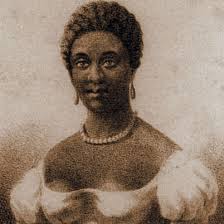Following the death of her owner, on this day in 1775, Phillis Wheatley was freed from slavery.
Noting her poem, An Hymn to the Morning seems right on this occasion.
Attend my lays, ye ever honour’d nine,
Assist my labours, and my strains refine;
In smoothest numbers pour the notes along,
For bright Aurora now demands my song.
Aurora hail, and all the thousand dies,
Which deck thy progress through the vaulted skies:
The morn awakes, and wide extends her rays,
On ev’ry leaf the gentle zephyr plays;
Harmonious lays the feather’d race resume,
Dart the bright eye, and shake the painted plume.
Ye shady groves, your verdant gloom display
To shield your poet from the burning day:
Calliope awake the sacred lyre,
While thy fair sisters fan the pleasing fire:
The bow’rs, the gales, the variegated skies
In all their pleasures in my bosom rise.
See in the east th’ illustrious king of day!
His rising radiance drives the shades away–
But Oh! I feel his fervid beams too strong,
And scarce begun, concludes th’ abortive song.
Wheatley would become the second poet of African descent and the first woman of African birth to be published in America.
Her life was hard start to finish. And she died in abject poverty.
But, her work lives on.
The unsigned Wikipedia article tell us
“With the 1774 publication of Wheatley’s book Poems on Various Subjects, she ‘became the most famous African on the face of the earth.’ Voltaire stated in a letter to a friend that Wheatley had proved that black people could write poetry. John Paul Jones asked a fellow officer to deliver some of his personal writings to ‘Phillis the African favorite of the Nine (muses) and Apollo.’ She was honored by many of America’s founding fathers, including George Washington. Critics consider her work fundamental to the genre of African American literature. She is honored as the first African American woman to publish a book and the first to make a living from her writing.”
For more of her work, go here.
A person worth remembering…













